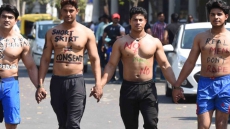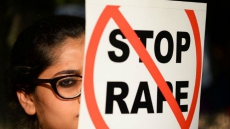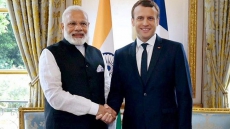Farmer suicides have been taking place across India for years now, and studies of rural distress reveal the deeply-rooted, tenacious causes, such as lack of irrigation, fragmentation of land, unsuitability of seeds and inadequate sources of credit.
Despite the democratically-elected governments that claim to represent a country where over half the population is dependent on farming, agriculture has been consistently ignored at a steep cost to farmers' lives. Remedies have been tried -- the state waived loans to small and marginal farmers ahead of elections and such sops were criticised after elections for disrupting credit discipline among the borrowers.
The crisis provided an opportunity to try more adventurous "remedies"; farmers were cornered into using expensive, genetically-engineered seeds, even when these added heavily to the cost of cultivation of crops like cotton, further indebting them.
Although this generated hope, which helped the governments get re-elected, none of the remedies worked. The question remained: Why did farmers commit suicide, bringing a bad name to "popular" governments?
So it became prudent and necessary for the state that other causes for the suicides were invented, such as alcoholism, depression, vices, etc. Farmers were blamed for being ambitious, extravagant, adventurous, lazy, cowardly, and too emotional. Camps were set up to help them cope with life's stresses, charities were organised and advice was dispensed.

Additionally, the state found the usual way of containing the situation; not all farmer suicides would be recognised as such. There were rules to dying; only those deceased farmers who had unpaid bank loans in their names or in the names of their families, and had land in their names or in the names of their families, were considered to fall in the "farmer suicide" category.
These "correct" suicides of the farmers, verified through this process, earned them compensation money, which was given to their widows.
Once again the state expected that such monetary relief would make the farmers, and voters in general, appreciate the kindness of the politicians and re-elect them. And once again, it was not a remedy. The question still persisted: Why did farmers commit suicide despite such "generosity" of the state?
Again, it became imperative for the state to find other reasons to explain why it failed to contain farmer suicides. It was believed that the compensation itself encouraged farmers to kill themselves; that the Rs 1 lakh might have increased the toll, and that farmers who died due to other reasons were shown as farmer suicides.
But the state knew the truth, because the compensation procedure ensured that each farmer suicide was investigated in depth. The state was aware that farmer suicides happened because of one essential reason -- the farmer's sense of fairness and responsibility was hurt by his continued inability to repay debts.

This explanation was in stark contrast to the ease with which the state and politicians tried arbitrary solutions to farm distress and blamed farmers for their own deaths. It was an inconvenient truth that would have shifted the guilt to the state and was, therefore, never told. Meanwhile, the question continued: Why did farmers commit suicide, denting the image of every charismatic Prime Minister of the country and every dynamic Chief Minister of the state?
Farmer suicides reflect the crisis brewing through several phases of structural transformation of the rural sector. The first phase, from the early 1950s to the mid-1960s, focused on land reforms, irrigation, and objectives like supply of credit, which are yet to be uniformly achieved.
The second phase was the Green Revolution, during which the implications for distribution of resources, and economic and social development were ignored, and agricultural development was measured through productivity. The last phase was the period of economic reforms and globalisation, which only widened and deepened the inequalities.
During this time, and under the aegis of politically-correct pro-farmer governments, agriculture had become particularly difficult in rain-fed areas due to a fall in public investment in irrigation and infrastructure, and in technological research and innovations. Maharashtra presented the contradictory picture of extreme agricultural failure along with high non-agricultural growth. This disparity was sharpest in western Vidarbha, where the farmer was entirely at the mercy of the weather, the market, and the state's indifference.
The wide regional as well as inter-district differences suggest the study of the region as a unit, like Vidarbha, which displayed the severe impact of farm neglect. Further, owing to the intensity and length of the farm crisis, the study of Vidarbha mapped the diversity of conditions and the common factors for farmers' distress, such as indebtedness, rising costs of cultivation, declining returns, and inadequate policy support.

The region also indicated how small and marginal farming could not be sustained without substantial public infrastructure support, and that the solution had to include initiatives of both policy and civil society. In what might be true for the entire nation, agricultural distress in Vidarbha was also worsened by the opportunism of the political class that used the crisis in blame-games instead of meaningful and timely interventions.
The neglect that the farmers face through their lives has no witnesses, except perhaps, their wives. They knew how the state ignored their husbands while they were alive, how their desperate applications for welfare were dismissed, how many times their husbands visited the collectorates for relief, how much money was spent appeasing local officers like tehsildars, gram sevaks, panchayat members, talathis, etc. The wives had seen their husbands lose faith, and found the empty pesticide bottles that had ended their lives. These were the caring mothers who rescued the memories of their fathers for their children, shielding them from the painful facts.
These were the grieving women who, within days of a suicide, convinced the state of the good mental condition of their husbands, signed documents attesting to the "truth", and accepted the meagre cheques. But for the state, they did not exist. After all, what did the widows of farmers know about agriculture, crop management, bank loans, private debts, land documents, health bills, power connections, panchayat politics, children's education? The short answer was -- everything.





